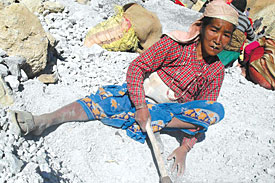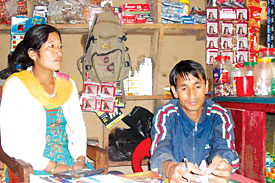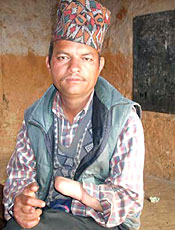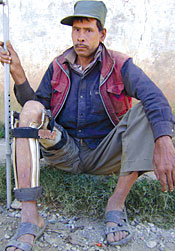 LAXMAN KC Last words: Deusari Pun, wounded during the war, died last month, soon after this picture was taken. |
The bullet wound in her pelvis never healed, yet she moved around with a crutch and worked by the roadside breaking stones. She told us last month: "I couldn't get any treatment, even when I went to all government and non-government agencies."
The open wound had infected her bones, and her face was contorted in pain as she told us: "There is no one to help, they should have just killed me."
 Bimala Pun and Paban BK were both shot and wounded by state security in 2002. . |
Two weeks after we met her, Deusari died. Nepal's ten-year war is still claiming victims.
In Salle, Narjit Basnet is teaching a Grade 8 class in the Saraswati Secondary School as he has for the past 15 years ever since his left hand was chopped off at the wrist by Maoists after he refused to join the revolution. They dragged him out of his former school at Amachaur, cut him into pieces, threw him into a river and left him for dead.
"I just hope no one has to suffer like me," says Narjit, "I want peace and development in this country. And maybe some help for people like me who were handicapped during the war."
 Narjit Basnet showing his chopped off hand. |
The Maoist war started 15 years ago in these mountain villages of Rukum and Rolpa. The conflict ended nearly five years ago, but the suffering of the tens of thousands of Nepalis like Narjit continues, and doesn't register in the priority of politicians in faraway Kathmandu who are caught up in their own power struggle. Of the 16,000 people killed during the war, more than 1,000 died in Rukum between 1996-2006. Another 2,000 were wounded here.
Bimala Pun is from Chunbang, the village in Rukum made famous for the Maoist convention in 2005 during which the leadership decided to form an alliance with the democratic parties. The party ordered Bimala and hundreds like her to march down to Kapilbastu in the plains to capture jamindar land in 2002 where she was wounded in a police attack.
The Maoist party sent her to a city hospital, but she still has a bullet lodged in her leg, and says it is unbearably painful in winter or when she has to walk a lot. "Till when do I have to suffer like this," she asks, "how many times do I have to ask my party to help take the bullet out?"
 Indra Lal Gautam had his legs crushed by Maoists. |
Paban BK was conscripted for the Maoist attack on the APF base in Satbaria in Dang in 2002. He was hit in the spine and was in a coma for nearly two months. He has been a paraplegic ever since. The party gave him a job, but he finds it hard to take care of his five-member family.
Paban has only two requests to his party: "Write the new constitution and give jobs to those who were handicapped during the war."
The year the war started in February 1996, Indra Lal Gautam was attacked by the Maoists for being an NC supporter. They crushed his legs with rocks, crippling him for life. Today, Indra Lal repairs umbrellas in Khalanga to feed his family of five.
Indra Lal has seen funds sent to Rukum for compensation for war wounded being diverted by political parties and distributed among themselves.
Indra Lal's greatest disappointment is against his own party. He says: "They forgot our suffering."


